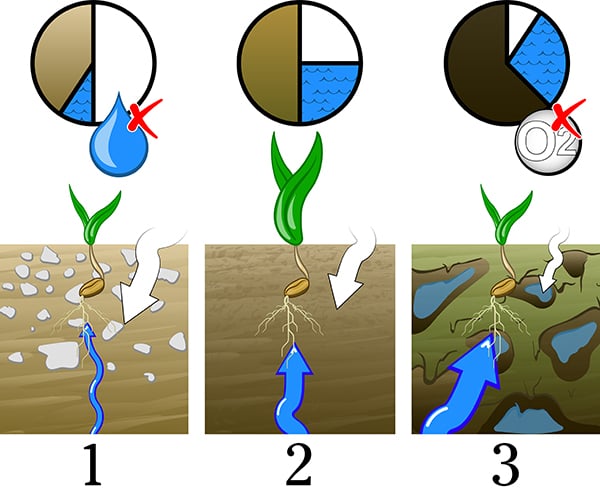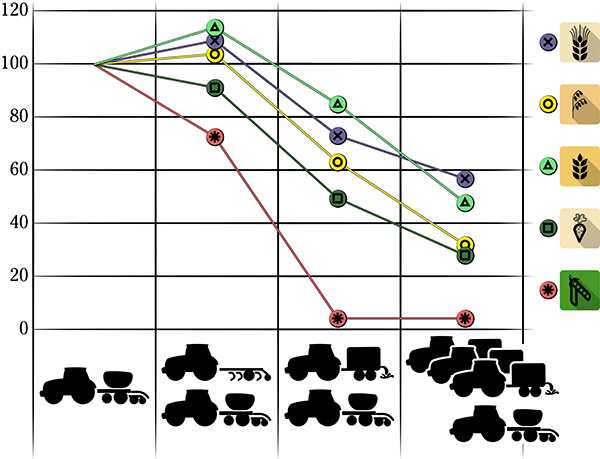Written by Home Guides Staff and published on https://www.vaderstad.com/.
Soil compaction is a major cause of tree decline in urban areas. Compaction occurs when a force, such as feet, vehicles, and even water from some sprinkler systems, creates pressure on the soil surface and compresses the soil particles. This force causes the soil aggregates to break into smaller particles, reducing the amount of pore space in the soil and increasing the bulk density. The reduced pore space hinders aeration, water infiltration, and root penetration. A lack of soil oxygen and poor water drainage retard root growth, jeopardizing the health of the tree.
Soil compaction
Soil compaction results in compression of pores that would otherwise transport water and air. This impedes root growth and can cause oxygen deficiency. Soil compaction can lead to a severe decrease in yield.
Soil compaction by definition means that the density of the soil increases when it is compressed. In other words, the soil becomes denser and every litre of soil weighs more when the pores are compressed. It is often easy to understand and gauge the effects of soil compaction from watching a tractor tyre roll over loose soil in wet conditions.
Roots impeded
Soil compaction results in root growth being restricted and affects mechanical resistance to root development in two ways:
- Compaction decreases the number and size of large pores, macropores. As a result, there are fewer pores with diameter larger than roots in which the roots can grow freely, without mechanical resistance
- Compaction increases the mechanical resistance of the soil through pressing soil particles more closely together
Water transport restricted
Soil compaction also restricts the movement of water down through the soil. This causes water saturation in the upper layers, which in turn can lead to oxygen deficiency for the roots according to image above. In addition, soil aeration status affects the availability of various plant nutrients, e.g. nitrogen and manganese. Under anaerobic conditions, denitrification can lead to severe loss of nitrogen in the form of nitrogen oxide or nitrogen gas to the atmosphere. Soil compaction can thereby decrease nitrogen availability in the soil.

Essential air: Guideline values for soil air-filled porosity: >25% air means good aeration, 10-25% air can result in limitations in certain conditions, and <10% air is characteristic of oxygen deficiency.
Possible remedial measures
To avoid soil compaction, it is important to employ remedial measures that can contribute to better soil structure in the long term. Such measures include drainage, structure liming, keeping the soil covered with vegetation and supplying external organic material. These measures, which result in the soil being drier, decrease soil compaction at depth.
Cropping system and soil tillage are also critical for soil compaction. The most important consideration is to avoid tillage when the soil is too wet. A dry soil has greater bearing capacity for loads, while a wet soil is compressed under a similar pressure. Having a large contact area with the help of broad tyres or dual wheels results in a lower wheel load. Number of passes as shown by the results in image below is also important, as is keeping the total weight of field equipment as low as possible.

A trial (L2-7118) at Önnestad, Skåne, in 2000 examined how soil compaction before spring sowing affected the yield of different crops (barley, wheat, oats, sugar beet and peas). The compaction consisted of different numbers of passes with a heavy load over the field before sowing:
- Sowing without compaction
- One pass + sowing
- One pass with a slurry tanker + sowing
- Three passes with a slurry tanker + sowing
The results showed that yield of spring wheat, barley and oats was positively affected by some compaction, i.e. one pass + sowing. For sugar beet and peas, however, yield was decreased even by this treatment. When the number of passes and thus the amount of soil compaction was increased, yield of all crops decreased. The crop most negatively affected was peas, which are very sensitive to oxygen deficiency.
Original post here https://ift.tt/3m6Cz6I.
The post What is Soil Compaction? appeared first on Townsville Tree Lopping Services.
from Townsville Tree Lopping Services https://ift.tt/3ocvt2b
via IFTTT
No comments:
Post a Comment